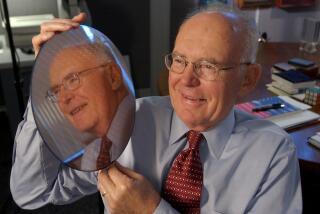Schlumberger Ltd. May Sell Fairchild
- Share via
NEW YORK — Schlumberger Ltd., a leading oil services firm that last week ousted its chairman, is likely to sell off its Fairchild Semiconductor division, industry analysts said today.
Schlumberger bought Fairchild in 1978 for $425 million, and the manufacturer of microchips has lost money almost every year since. Fairchild, based in Mountain View, Calif., is the nation’s second-oldest semiconductor manufacturer behind Texas Instruments. Schlumberger is now run by D. Euan Baird, who last week took over as chairman from Michel Vaillaud. Baird is the first American to run the Paris-based company that has operations in more than 100 countries.
Had No Comment
Wall Street analysts who met with Baird on Wednesday said he declined to comment on talk that Fairchild might be sold. They interpreted that as a sign that Fairchild is up for sale.
“It means that something is going on--that’s my interpretation,” said James Carroll, a Paine Webber analyst who attended the meeting.
“I think the message was that Fairchild is not likely to be part of Schlumberger for the longer term,” said Shearson Lehman Bros. analyst Kenneth Miller.
Carroll said the semiconductor business lost $165 million in 1985 and said he expects it to lose another $125 million this year.
Unsuccessful Effort
Schlumberger made $351 million last year on revenue of $6.1 billion.
“Schlumberger tried to turn the business around, but no matter how much money they poured into it and what they did to management, the downward momentum continued,” said analyst Elliot Levine of Ladenburg Thalmann & Co. Levine said it is unlikely that other semiconductor companies, such as Texas Instruments, Motorola or Intel, would buy the faltering unit.
Rather, he said, it is more likely that an industry giant such as American Telephone & Telegraph or General Electric or perhaps a foreign competitor will step in.
“With the industry running at 30% to 40% of capacity, whoever buys it is going to have to mothball it until the industry picks up,” Levine said.
More to Read
Inside the business of entertainment
The Wide Shot brings you news, analysis and insights on everything from streaming wars to production — and what it all means for the future.
You may occasionally receive promotional content from the Los Angeles Times.








